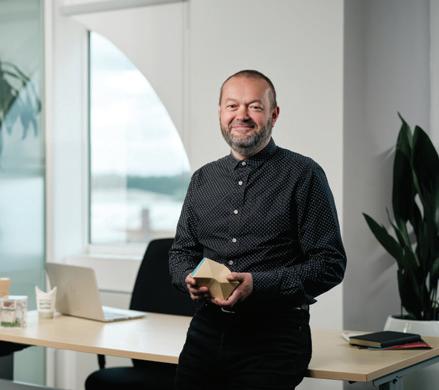
9 minute read
What does the future hold for plastic packaging?
from S02
The unpalatable fact is that the UK still produces too much waste and does not recycle enough of it. Currently the UK is falling short of its 2050 target to prepare 65% of municipal waste for reuse and recycling, and plastic packaging is an important part of this story. As of 2021, the UK has a recovery/recycling rate of 44% for plastic packaging, while materials such as aluminium (75%) and paper and cardboard (70%) are much higher.
It is easy to point at plastic packaging to say the material is a problem, to get caught up in the good-bad debate that polarises public opinion and media commentary. However, when items are made from reusable and recyclable plastics and managed correctly, they provide sustainable, cost-efficient, and durable packaging solutions.
Advertisement
Creating plastic positivity
The five best ways to create a more positive future with plastics involve utilising recyclable plastics, increasing capacity and infrastructure, reducing contamination, replacing single-use plastic, and simplifying packaging.
WRAP's 2022 update to its annual recycling tracker shows that 90% of UK citizens regularly recycle when asked about all types of materials. However, the recovery rate of plastic packaging is 44% because much of it (flexible plastics or pouches) is not recyclable or reusable. While recycling is part of the nation’s day-to-day activities –and the motivation and behaviour are clear – the packaging used for many products does not support recycling.
What can be done about this? People and businesses need information to guide and support their choices. From businesses’ product design and packaging decisions to consumers’ purchase choices, understanding is needed at every stage of the process. If people know more about the dif ferent types of plastic and the environmental and economic impact of their choices, then a change in behaviour would be more likely, all the while increasing the quality of recyclable material by creating separate waste streams.
When recyclable plastic packaging leaves the UK, the carbon cost of transportation leads to more emissions compared to onshore recycling. There is a clear argument for more plastic to be recycled in the UK; to support green investment, infrastructure, economic growth and jobs.
An end to the export of plastic packaging would mean the UK must recycle the 0.7mtpa of plastic packaging waste a year currently exported. This would take at least 12 polymer plants with a minimum 55,000tonne processing capacity. Biffa’s 57,000tonne capacity recycling plant in Seaham brought 100 full-time jobs to the local region. Investment in infrastructure benefits both the economy and local communities in addition to the environment.
The Deposit Return Scheme in Scotland, launching 16th August 2023, is an example of how bold legislation can drive investment in and improvements to recycling infrastructure. As the logistics provider for the Scottish scheme, Biffa is developing new facilities to handle increased volumes of materials. The consultation for England, Northern Ireland and Wales is now complete, with the launch date set for 1st October 2025.
Implementing change
Last year, Biffa highlighted that nearly a fifth of all recycling is lost due to contamination. Food contamination on or inside packaging is one of the major issues hin dering our recycling efforts, but it doesn’t have to be this way. Increased awareness around the recycling process and the impact of contamination will help change behaviour for consumers and businesses.
There are plans for legislation to make the current voluntary, on-package labelling system mandatory. This needs to be realised for both consumer and business packaging, with the clearest messaging possible, to drive awareness of what the recycling symbols mean and the condition a container needs to be in to be recycled. This will reduce the amount of unrecyclable material in the UK collection and processing systems, improve the quality of our recycled materials and lower the carbon emissions output.
Our industry, regulatory bodies and government need a greater understanding of the packaging materials in circulation. Extended Producer Responsibility begins this year, obligating businesses to report greater detail on the packaging they pro duce and in what quantity. This will provide valuable insight to support customer choice and promote better packaging design for recycling.
The UK government recently announced its intention to ban certain single-use plastics, including plates and cutlery. While this is a welcome step in the right direction, the plastics themselves are not the problem; it is that they are single use. As single-use plastics are phased out, they need to be replaced by more multi-use or reusable options.
From bamboo cutlery to plant-based plastic alternatives, any material in a singleuse and on-the-go context presents a unique challenge. For example, it doesn’t matter if something is compostable if it ends up in general waste or if non-recyclable materials are put in the recycling bin. Both result in resources being lost and emissions being created.
The ban on single-use plastics will help increase the use of readily recyclable
You can learn more about Biffa and its efforts towards sustainability here: www.biffa.co.uk/sustainability packaging solutions, however, it is just one piece of the puzzle that will help the UK circular economy.
Overcoming hurdles
Brands are operating in highly competitive markets, working with tight margins. Packaging needs to be easy to fill, protect the contents and catch the eye of consumers in a split second in saturated environments. Often this leads to choices in colour and materials that render the container unrecyclable. It does not have to be one or the other; it is possible to create sustainable plastic packaging that speaks to the consumer.
Commonality and consistency are key to creating simple, sustainable packaging. If materials or different types of plastic are mixed, then it becomes harder to separate these materials and recycle them.
Packaging such as laminated material, plastic wrapping and big sleeves need to be separated or recycled at specialist facilities; this is often impractical and unsustainable at scale.
This is also true of packaging that contains more than one colour of plastic. No food-grade coloured plastic can be recycled back into natural-coloured food-grade packaging as the pigment remains in the polymer. When mixed pigments are recycled together, the material becomes grey. Adopting clear plastic wherever possible will help move towards more sustainable packaging. Improvements can also be made by shrinkwrapping labels rather than gluing and tethering bottle tops to bottles (ideally the same colour).
Plastic packaging is unlikely to lose its edge if it is clear, homogenous and con sistent. Eye-catching designs can still be used, provided the components are easily removed and recyclable.
Increasing public awareness will support positive changes in consumer behaviour. People want to do the right thing, and those brands which explore sustainable options first will catch the eco-conscious eye and achieve cut-through. The time to start is right now.
Biffa supports some of the UK’s leading brands through this process. Its Blueprint for Waste Net Zero outlines the role of recyclable plastic packaging within the future carbon hierarchy and what further changes are needed to deliver a truly cir cular economy. n
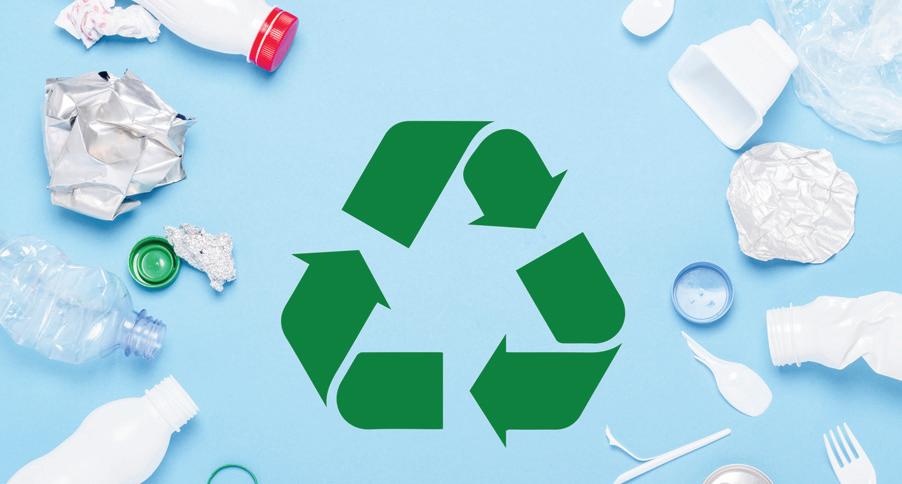
Award-winning CJ Sheeran is an experienced manufacturer of timber packaging. Incorporated in 1994, and with a long history in the industry dating back to the 1960s, the company has been on a continuous mission to aid the planet and minimise its environmental impacts wherever possible. Group Compliance Manager Brian Fingleton discusses the company’s sustainable efforts, as well as the processes it aims to implement soon, in a report by Imogen Ward.
CJ Sheeran recently won the Pakman ‘ Business Recycling Champion’ award as part of its efforts to lead by example and maintain a sustainable operation. This joins the company’s collection of impressive accolades throughout its history.
“The Pakman award is a national environmental award that recognises excellence in recycling and waste management,” Group
Compliance Manager Brian Fingleton said. “It’s a brilliant accolade for the business; it’s also a great acknowledgement of the hard work and continuous efforts the CJ Sheeran team put in daily.”
Ireland’s leading manufacturer of timber packaging, CJ Sheeran, creates premium wood packaging timber products. With headquarters located in Mountrath, and a further seven sites dotted throughout the
Republic of Ireland, the company is perfectly situated to serve all its customers’ needs.
As the only pallet manufacturer in Ireland to possess separate manufacturing plants, CJ Sheeran is fully prepared for any eventuality.
Focusing on the planet, the company has worked hard to reduce its carbon footprint. As a result, it has been shortlisted for three categories in the 2022 Green Awards (The Excellence in Waste Management Award, The Sustainable Energy Achievement award and The Green Manufacturer Award).
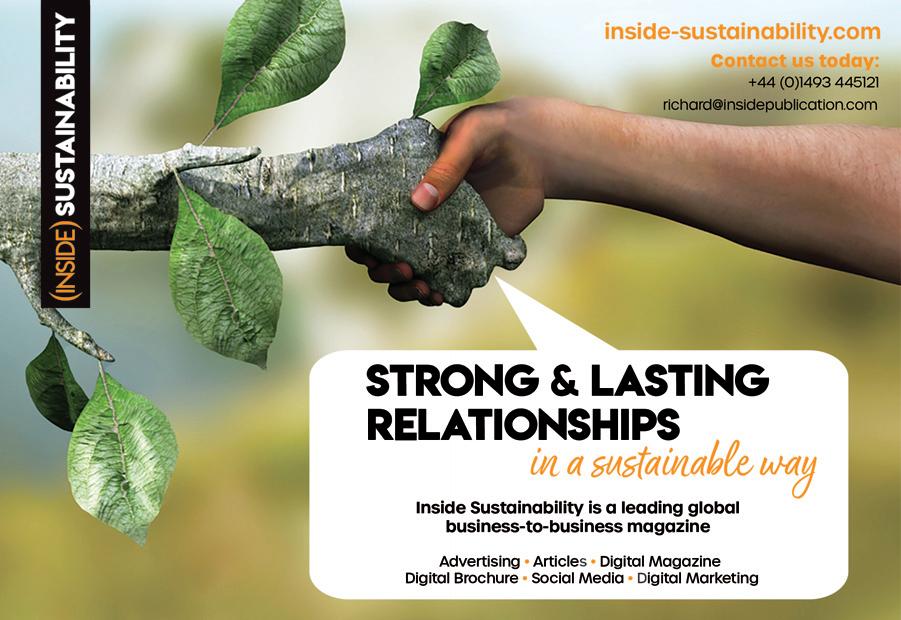
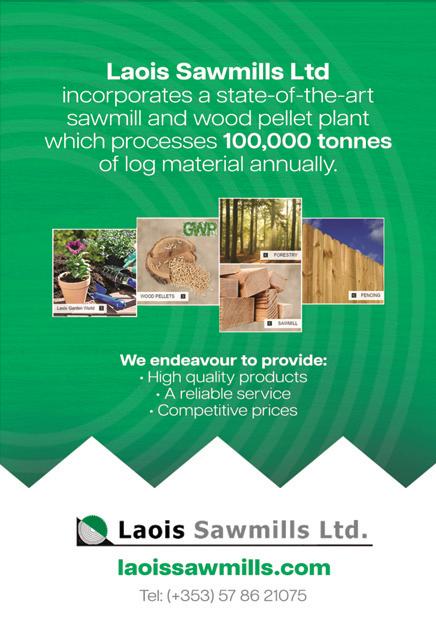
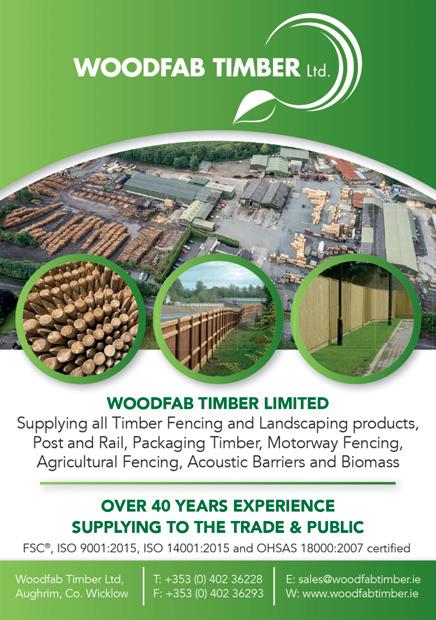

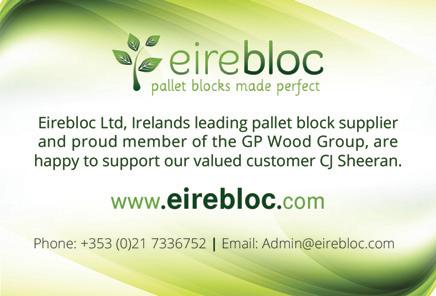

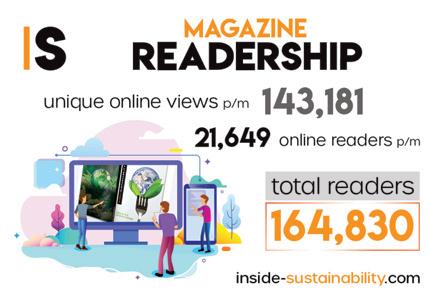

Excellence in waste management
Recycling is an essential for this packaging manufacturer. Having set up a pallet recycling programme to help minimise consumer waste, the company successfully recycles 3 million pallets each year.
CJ Sheeran has a fleet of 80 trailers and would position them across Ireland to act as collection points at customer sites. These trailers are then brought back to the main recycling centre in Mountrath and sorted by a team of professionals into four categories: no repairs required, boards or block replacement required, dismantlement for reuse and irreparable.
All pallets in good condition, and those that were repaired by the company, are then stacked up by type ready for reuse. The dismantled pallets are used as part of the repair process for damaged pallets, and the remaining stock of irreparable pieces are shredded. Residue and offcuts from the pallet recovery operations are shredded into woodchip, which can be used as biomass fuel and is WFQA certified.
Under the CJ Sheeran name is ComfyBed: the company’s brand of equine bedding.
Again, produced from offcuts and residue from the pallet manufacturing operations, ComfyBed is the official sponsor of RDS Dublin Horse Show and is used to bed some of the world’s best show jumping horses. This effectively highlights the premium quality of this recycled material.
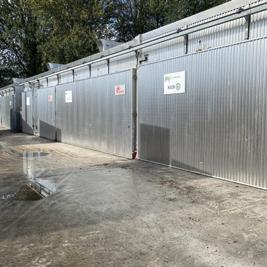
Sustainable energy achievement
As part of the company’s valiant efforts towards energy sustainability, a biomass boiler was purchased to minimise CJ
Sheeran’s carbon footprint. The group now uses 4,000 tonnes of woodchip to generate the energy required for the 10 kilns to both heat treat and dry their pallets, carried out under the ISPM15 licence. These kilns are crucial to the operation: by heat-treating the wood, CJ Sheeran ensures quality control and optimum safety for clients.
“The company plans to be carbon neutral by 2025, or sooner,” Mr Fingleton said. “Our biomass boiler is helping us get to that stage; 62% of the energy used by CJ Sheeran is produced by our biomass boiler.
As a result, we successfully displace 1.5 million litres of kerosene every year, which equates to approximately 3,800 tonnes of carbon.
“Heat-treatment prevents wood-boring insects, which involves a process of bringing the kilns to 56 degrees and then maintaining this temperature for a total of 30 minutes,” Mr Fingleton said. “The other important process is kiln-drying, which is used when customers require dry pallets for deliveries. The overall moisture content of a pallet after this process will be around 19% (depending on the client’s request) compared to pre-kilning.”
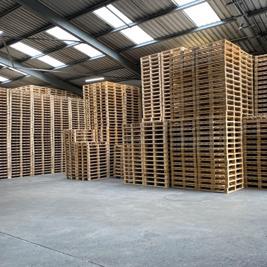
The company has an ISO 14001 Environmental Management System in place, making it the only pallet manufacturer to be certified with this. As part of its continuous improvement, the company was also accredited the ISO 50001 (energy management system) in April 2022. “We put systems and procedures in place to better understand the company’s energy consumption,” Mr Fingleton explained, “this also enabled us to measure our use and reduce it, which is better for the environment and much more cost effective.
“This not only helps us better understand our carbon footprint, but it has also encouraged us to have important conversations with our customers regarding our sustainability.”
Green manufacturer
There is only room for FSC approved suppliers at CJ Sheeran. Following its Green Procurement Process, the company only purchases timber from FSC approved suppliers. The company also prefers to partner with local suppliers where possible, which helps to reduce the carbon footprint of all CJ Sheeran’s operations.
This FSC approved timber is used in the production of all new pallets.
When manufacturing, there is a perfect balance of manual and automated production lines at the company. The automation lines at CJ Sheeran can make 80,000 standard sized pallets a week. With a flexibility to produce bespoke pallets and wood packaging products to meet a customer’s size requirements, the company makes these larger pallets manually, manufacturing around 4,500 a week.
Passion is prevalent in the individuals who make these products. The company operates an employee development and training programme under the brand name Talent Tree, giving workers the skill set needed to progress within the company.
“Here at CJ Sheeran there is a vibrant team who always maintain a can-do attitude,” Mr Fingleton said. “Our work is very customer-focused, and our training programme, Talent Tree, ensures employees have the best tools to provide excellent customer service and care. We also provide access and support to programmes including the green belt and black belt training, apprenticeships and college courses too.”
With a new year comes the opportunity to implement new objectives. A major task CJ Sheeran is undertaking in 2023 is “implementing digitisation across the Group”. Mr Fingleton concluded, “we will be assessing our current capabilities and creating a future state map, where we expect to deliver KPI dashboard screens, labour efficiencies derived from leaner systems, achieving savings on paper and data inputting which will make our company even more competitive.
“Ultimately, our goal is to continue expanding and the recent addition of our Coolrain and Cavan sites will aid this objective. Implementing digitisation is just another step towards achieving our company goal of carbon neutral by 2025 or sooner.” n








